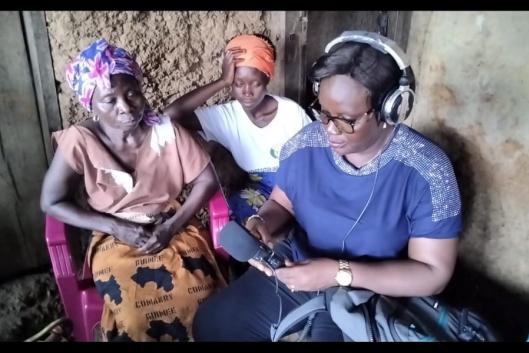The name Socfin has been synonymous for violence and oppression in several West and Central African countries where the company operates industrial oil palm plantations. Sierra Leone is no exception. In collaboration with Aminata Finda Massaquoi, a journalist and the national coordinator of the women’s advocacy network WORNAPI, WRM is releasing a podcast to highlight the different layers of oppression women face once industrial plantations invade their territories.
Listen to the podcast:
“They work the land and therefore they are land users”
Oil palms are a traditional crop for many communities in Sierra Leone and across West Africa. Aminata Finda Massaquoi explains how “Palm oil is a vital part of the foods we eat every day. It has deep cultural benefits and it is the mainstay of our traditional economy, which is driven mostly by rural women. While the men usually grow and harvest the fruit, the women provide most of the labour required to extract the oil. This gives them a great deal of social prestige and economic benefits.”
Aminata has been working with and advocating for the rights of rural women for many years: “I have listened to their complaints and seen the realities on the ground for most of them.” “They work the land and therefore they are land users,” she explains.
The Malen Chiefdom, in Pujehun district in southern Sierra Leone is one of the largest palm oil producing districts in the country. It is an area that was badly affected by the 1991 to 2002 civil war. Yet, the importance of this crop to women and the local economy is under threat. Why? It has to do with the multinational company Socfin, a subsidiary of the Luxembourg-based multinational, the Socfin Group. The arrival of the company meant that industrial monocultures have pushed traditional palm oil production to the margins, leaving behind a trail of destruction and devastation for communities living in and around these plantations, in particular for women and girls.
Aminata reminds us how, when companies arrive to the communities, their representatives engage with the men and exclude women from the negotiations. Even though, as she says, “In the end, it is the women and their children who suffer the most. Besides losing farmlands, women also lose their own small plantations-which guarantees them a regular source of income.”
With the aim to learn from women who are most affected by the company’s arrival in this area, Aminata travels to the Malen Chiefdom. She tells how the biodiverse landscape radically changes in this area, with hectares and hectares of oil palms on either side of the road. In 10 years, the forests and fertile land of the Malen Chiefdom were transformed into thousands of hectares of oil palm monocultures.
Aminata explains that in 2011, Socfin signed a 50-year land lease agreement with the government of Sierra Leone and the local Chiefdom authority, which handed more than 18,000 hectares of land over to the company –and that’s nearly 70 percent of the Chiefdom’s total area.
The deal has sparked over a decade of violence and division in Malen Chiefdom, with local residents saying that they were not properly consulted or compensated for their lands. And that Socfin has not lived up to its promises of building of schools, roads, hospitals and providing scholarships.
Mamie Sannoh is the first one Aminata speaks with. Sannoh is from the village of Jumbu Malen, a small community on the main road leading to Sahn Malen town. Sannoh has five children and five grandchildren to look after. She leased her land to Socfin in 2011, and says she received only a small amount of money in return. Mamie Sannoh says: “We used to grow peanuts and peppers, and process our own palm oil. But we have to buy all of these things now. When I had my land, I would just get palm fruits from my garden, process them, extract the palm oil and sell it. Now we don’t have land, and we don’t have money.” Worrying about not having enough food for her children, she says, “I regret it now. If I still had my land, I’d be able to grow a lot of things and survive, but now I cannot do that. How will I survive?”
Not everyone in this Chiefdom agreed to lease their lands to Socfin. But even the families that held on to their lands are suffering. Aminata spoke with Mariatu Kambo from Jumbu Malen in Kemoh section. Mariatu explains “I have a small plantation of palm oil here but I can’t process it because the company doesn’t allow us. I don’t have anything to do. Even when I harvest my oil palm fruit, I cannot process it. As soon as they see us here, security men come and accuse us of stealing the company’s palm fruit. Now, even getting hold of palm oil to cook with is difficult for us. There’s nothing we can do.”
Since the company's arrival, communities, and women in particular, have faced violent incidents, criminalization and harassment. Strong resistance also emerged, mostly led by women. A resistance speaking with one united voice: lands must be returned to the traditional care-takers.
Aminata also spoke with Aminata Fabba, the Deputy Chairlady of the Malen Land Owners and Users Association (MALOA), who said “We are like tools in the hand of the company and the paramount chief. The paramount chief does to us what the company wants and they ignore our concerns.” Fabba says that the women in Malen want the land deal with Socfin to be renegotiated …or the people must have their lands back.
